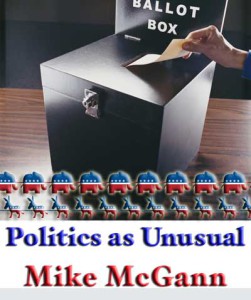State pols continue to labor under budget, tax delusions
By Mike McGann, Editor, The Times
 Ah, nothing says “holiday seasons” like the ongoing state budget stalemate.
Ah, nothing says “holiday seasons” like the ongoing state budget stalemate.
Perfectly, both Democrats and Republicans continue to labor under impressive delusions about the current state of the commonwealth — and the outcomes of some proposed legislation that would provide cornerstones for a possible budget agreement before year’s end.
First off, we’ll start with the most reasonable — despite the current state of denial by the state’s legislative Democrats and Gov. Tom Wolf. The State House of Representatives passed a true liquor privatization bill Thursday, 110-86, and the bill stands a solid chance to pass the State Senate. Where it seems likely to die is the Governor’s desk, which would be a mistake.
Set aside the fact that virtually everyone not in a public sector union agrees that the state needs to get out of the liquor business, the bill would double the number of outlets in the state and allow for true competition, variety and better pricing. Consumers would win, and we’d see the end of folks running to Delaware, Maryland, New Jersey, Ohio, New York and West Virginia to buy alcohol.
This is one of those common sense deals — and one that Wolf should have been able to barter with to get movement on his priorities, such as schools funding.
Another piece of the package that also appears to have some legs is the “hybrid” pension fix. In short, new hires would see their retirements managed as a blend of old-school pension and 401K style defined contribution system. Unlike swapping new hires totally onto a 401K system — which would ultimately bankrupt the pension system and create a pension crisis an order of magnitude beyond today’s mess — this would be the kind of slow, steady fix to the problem that would actually work. Of course, the devil is in the details, but the first blush of the plan looks like it could be a sustainable fix, assuming all sides agree.
And then there’s property tax — specifically, the portion of it that funds local schools.
Right now, there are a couple of different frameworks out there, one plausible, another bat-something crazy.
There seems to be agreement to raise the state sales tax by about $2 billion, which would then be used to help lower property tax, by better funding local schools. How that funding will be doled out — and how much impact it will have in suburban districts remains to be seen.
Whether folks want to admit it or not, the current property tax crisis has been driven by the state constantly cutting funding for schools at the same time as increasing unfunded state mandates — a sneaky “we didn’t raise taxes” move by our local friendly state legislators (of both parties) who then get to blame those reckless school boards for hiking taxes. It’s a scam that’s worked because school board directors have been sheepish about calling out legislators and voters have been gullible.
The fact of the matter is that returning state school funding percentages to 1980s levels would solve a lot of property tax problems. The current Act I guidelines could be tweaked to require dollar for dollar property tax revenue cuts to match increases in state funds — a move to both lock in savings for taxpayers and prevent future legislative shenanigans to cut funding again, as it would immediately lead to property tax hikes.
What won’t fix our schools but would turn the state into an educational basket case, like neighboring Delaware, is SB 76, the bill that would eliminate property taxes for schools.
Yay! No taxes.
Also, lousy schools, with no local accountability or local control. Yeah, that ought to work.
Pay an extra $20,000 to $30,000 for a home in a high-achieving school district? Pass SB 76 and watch your home property value decline precipitously. Yes, you too can save $500 a year in taxes (assuming the added sales tax hit) to lose tens of thousands of dollars in property value and see your local high achieving schools become mediocre at best.
Don’t think so? Check out the Philadelphia or Chester-Upland schools to see how good the state is at running local schools and get back to me. Local school boards would be left with virtually zero power to shape their districts and determine priorities if the power of the purse is removed.
Do you really think some bureaucrat in Harrisburg knows best what your local school needs, or a neighbor, duly elected by the local community?
Look, I know that we need to do something for retired folks on fixed incomes. At least those on fixed incomes below a certain amount. I am routinely amazed at the cojones of some seniors who cry about being on “fixed incomes” that turn out to be $125,000 or higher — more than a lot of us working folks with kids and mortgages earn. They just don’t want to pay their share, it’s not need, it’s greed.
For folks with incomes below $75K, it would make sense to create a sliding scale of property tax exemption.
Tossing out the entire property tax system, ending local accountability and wrecking our high performing local schools?
That’s idiotic. Any local legislator supporting such sophistry should be asked, not overly politely, to find a new line of work, come Nov., 2016.




